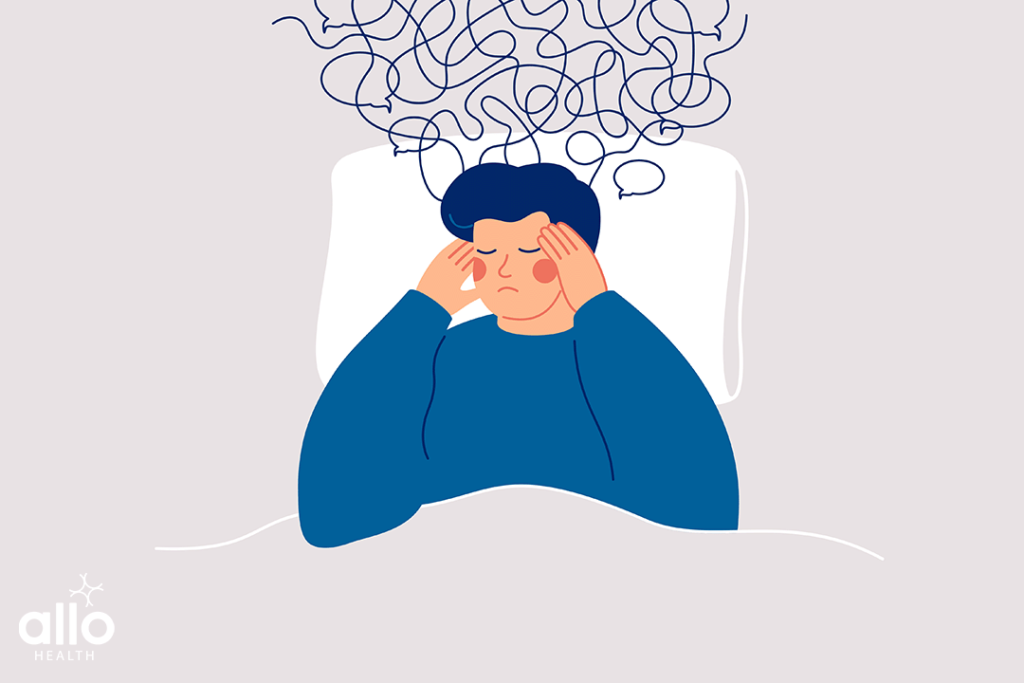How To Overcome Sexual Performance Anxiety?

Allo Health is dedicated to personalized well-being, offering support and trusted information tailored to individual health goals. The platform emphasizes human-generated content, led by a distinguished medical team of experts, including physicians and sexual health specialists. Their commitment to credibility involves rigorous fact-checking, authoritative research, and continuous updates to ensure accurate, up-to-date information. Allo Health's unique approach goes beyond conventional platforms, providing expert-led insights and a continuous commitment to excellence, with user feedback playing a crucial role in shaping the platform's authoritative voice.

A psychologist with clinical specialization and experience working with sub-clinical and clinical populations. Her areas of interest and expertise include anxiety-related disorders, mood disorders, psychotic disorders, addictions, sexual health and wellness, relationship issues, stress, and geriatric mental health.
Why This Was Upated?
Our experts continually monitor the health and wellness space, and we update our articles when new information became available.
Updated on 20 June, 2024
- Article was updated as part of our commitment to diversity, equity, and inclusion.

"The following blog article provides general information and insights on various topics. However, it is important to note that the information presented is not intended as professional advice in any specific field or area. The content of this blog is for general educational and informational purposes only.
Book consultation
The content should not be interpreted as endorsement, recommendation, or guarantee of any product, service, or information mentioned. Readers are solely responsible for the decisions and actions they take based on the information provided in this blog. It is essential to exercise individual judgment, critical thinking, and personal responsibility when applying or implementing any information or suggestions discussed in the blog."
What Is Sexual Performance Anxiety?
Have you felt anxiety creeping up right before sex? Do you feel overtly nervous? Sex is supposed to be an enjoyable and pleasurable experience. However, at times, many of us can be too “in our heads.” This can lead to embarrassment, insecurity, and one of the major things that many talk about, performance anxiety, a common sexual concern.
Sexual anxiety (sexual performance anxiety) is a common condition that affects all individuals. It is characterized by excessive fear and anxiety about one’s ability to perform with a sexual partner, which can lead to difficulty getting or maintaining an erection, premature ejaculation, or difficulty reaching orgasm.
There are a number of potential causes of sexual performance anxiety, including past negative sexual experiences, relationship concerns, low self-esteem, and stress. In some cases, it may also be related to underlying medical conditions or medications.
For those looking to address this condition, it is important to speak with a qualified healthcare professional who can help identify the root cause and develop a personalized treatment plan. With the right treatment, individuals can overcome their anxiety and improve their sexual function and satisfaction.
Types Of Sexual Performance Anxiety
There are several types of sexual performance anxiety, each with its own unique causes and symptoms.
Physical
This is characterized by a fear of not being able to physically perform during sexual activity. This can include concerns about erectile dysfunction or difficulty reaching orgasm.
Emotional
This is characterized by a fear of not being able to emotionally connect during sexual activity. This can include concerns about not being able to form a bond with a partner or feeling self-conscious during intimacy.
Anticipatory
This is characterized by a fear of not being able to perform sexually before even engaging in sexual activity. This can include worries about future sexual encounters and can lead to avoidance of sexual activity altogether.
Situational
This is characterized by a fear of not being able to perform sexually in specific situations. This can include concerns about performance in new or unfamiliar sexual situations, or with a new partner.
Causes Of Sexual Performance Anxiety
The symptoms can manifest in different ways, such as difficulty achieving or maintaining an erection, premature ejaculation, or a lack of sexual desire. While there can be a variety of physical, mental, and lifestyle causes for sexual performance anxiety, understanding them is the first step towards overcoming this concern.
Physical Causes
Physical causes include conditions such as:
- Erectile dysfunction (Hyperlink ED HB)
- Premature ejaculation (Hyperlink PE HB)
- Low testosterone levels
These conditions can be caused by a variety of factors, including age, diabetes, high blood pressure, and heart disease. In some cases, these conditions may be treated with medication or therapy, but it is important to consult a doctor for proper diagnosis and treatment.
Psychological Causes
Mental health causes include
- Stress
- Anxiety
- Depression
- Relationship concerns
- Poor body image
These conditions can affect a person’s ability to relax and enjoy sexual activity, making it difficult to achieve or maintain an erection. In some cases, therapy or counseling can help address these underlying concerns and improve sexual performance.
Lifestyle Causes
Lifestyle factors include:
- Smoking
- Alcohol consumption
- Lack of physical activity
These factors can affect a person’s overall health and well-being, making it difficult to achieve or maintain an erection. Quitting smoking, cutting back on alcohol, and exercising regularly can all help improve sexual performance and reduce anxiety.
Symptoms Of Sexual Performance Anxiety
Physical Symptoms
Physical symptoms include:
- Erectile dysfunction
- Premature ejaculation
- Difficulty achieving orgasm
Psychological Symptoms
Psychological symptoms include:
- Negative thoughts
- Self-doubt
- Fear of judgement
Lifestyle Symptoms
Lifestyle symptoms include:
- Avoiding sexual situations
- Difficulties with communication
- Relationship concerns
These symptoms can lead to feelings of isolation and a lack of intimacy, which can have a negative impact on overall well-being.
Treating Sexual Performance Anxiety
There are several treatment options, including:
Cognitive-Behavioral Therapy (CBT)
This type of therapy focuses on identifying and changing negative thought patterns and behaviors that contribute to the symptoms.
Medication
Certain medications, such as antidepressants and phosphodiesterase type 5 inhibitors (PDE5 inhibitors) can improve overall sexual functioning.
Sex therapy
A sex therapist can work with individuals or couples to address concerns related to sexual performance anxiety and provide techniques and strategies for improving sexual functioning.
Relaxation techniques
Deep breathing, progressive muscle relaxation, and visualization can help improve low sexual performance associated with anxiousness.
Lifestyle changes
Making changes such as exercising regularly, eating healthy, and reducing stress can improve overall health and reduce sexual performance anxiety.
Overcoming Sexual Performance Anxiety
Sexual performance can lead to a lack of confidence in the bedroom, as well as erectile dysfunction, premature ejaculation, and other sexual dysfunctions. However, there are ways to overcome the symptoms and improve your sexual performance.
Communicate with your partner
One of the most effective ways to overcome anxiousness associated with sex is to communicate openly and honestly with your partner. Talk about your fears, concerns, and expectations, and work together to find solutions.
Practice mindfulness
Mindfulness is the practice of being present in the moment, and it can be incredibly helpful for managing anxiousness. Try to focus on the present moment during sexual activity, rather than worrying about the future or dwelling on the past.
Exercise
Regular exercise is great for reducing anxiety and improving overall health, which can improve sexual performance. Aim for at least 30 minutes of moderate-intensity exercise, such as brisk walking or cycling, three to five times a week.
Get enough sleep
Sleep is essential for overall health, and lack of sleep can lead to increased anxiousness. Aim for at least 7 hours of sleep each night to ensure that your body is well-rested and ready for sexual activity.
Seek help
Consider seeking help from a therapist or counselor. They can help you identify the underlying causes of your performance anxiety and develop a treatment plan that works for you.
There is a lot of stigma around this topic, but the condition is much more common than you think and can affect anyone of any age. However, oftentimes, treatment or help is not sought by those experiencing it due to fear of judgement. We’re here to break treatment barriers; professionals can help you, and consulting with one is the first step.
To overcome anxiousness related to sexual performance, it is important to address the underlying causes, such as stress and anxiousness. Therapy, counseling, and self-help techniques can be effective in addressing these concerns. Medications may also be prescribed in some cases.
We encourage you to focus on self-care and overall well-being. Maintaining a healthy lifestyle, including regular exercise, a balanced diet, and adequate sleep, can help reduce the physical and mental symptoms of sexual performance anxiety and help maintain a healthy sex life.












































